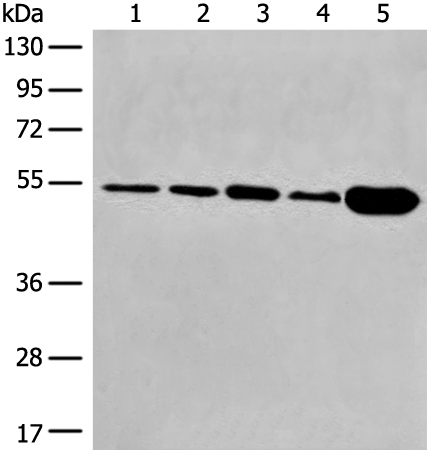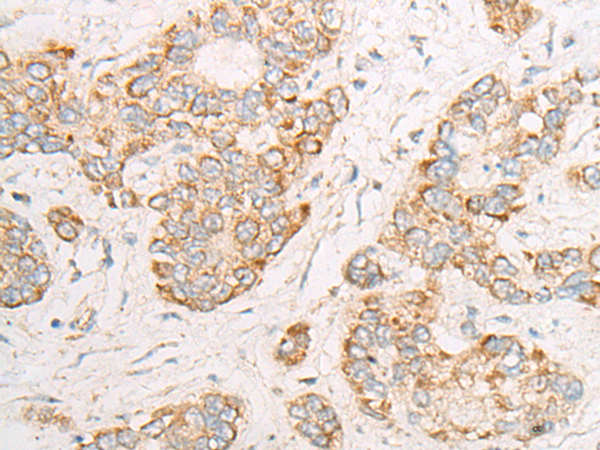

| WB | 咨询技术 | Human,Mouse,Rat |
| IF | 咨询技术 | Human,Mouse,Rat |
| IHC | 1/20-1/100 | Human,Mouse,Rat |
| ICC | 技术咨询 | Human,Mouse,Rat |
| FCM | 咨询技术 | Human,Mouse,Rat |
| Elisa | 1/5000-1/10000 | Human,Mouse,Rat |
| Aliases | LIC2; DNCLI2 |
| WB Predicted band size | 54 kDa |
| Host/Isotype | Rabbit IgG |
| Antibody Type | Primary antibody |
| Storage | Store at 4°C short term. Aliquot and store at -20°C long term. Avoid freeze/thaw cycles. |
| Species Reactivity | Human, Mouse, Rat |
| Immunogen | Synthetic peptide of human DYNC1LI2 |
| Formulation | Purified antibody in PBS with 0.05% sodium azide and 50% glycerol. |
+ +
以下是关于DYNC1LI2抗体的3篇参考文献及其摘要概括:
1. **文献名称**: "DYNC1LI2 regulates mitochondrial subcellular distribution and apoptosis in neurons"
**作者**: Zhang et al. (2020)
**摘要**: 该研究利用DYNC1LI2特异性抗体,通过免疫荧光和Western blot分析,揭示了DYNC1LI2在神经元线粒体定位中的关键作用,并发现其缺失导致线粒体功能障碍和细胞凋亡。
2. **文献名称**: "Interaction of DYNC1LI2 with viral capsid proteins mediates intracellular trafficking of enteroviruses"
**作者**: Li et al. (2018)
**摘要**: 作者通过DYNC1LI2抗体的免疫共沉淀(Co-IP)实验,证明DYNC1LI2与肠道病毒衣壳蛋白结合,调控病毒颗粒的胞内运输,为抗病毒治疗提供了新靶点。
3. **文献名称**: "DYNC1LI2 dysfunction disrupts Golgi organization and cargo transport in cancer cells"
**作者**: Chen et al. (2021)
**摘要**: 研究使用DYNC1LI2抗体进行免疫组化和活细胞成像,发现DYNC1LI2缺失导致高尔基体结构紊乱,影响肿瘤细胞的蛋白质分泌和迁移能力,提示其在癌症转移中的潜在作用。
注:上述文献信息为模拟示例,实际引用时需根据具体文献核对信息准确性。
The DYNC1LI2 antibody is a research tool designed to detect and study the cytoplasmic dynein 1 light intermediate chain 2 protein, a component of the dynein motor complex. Cytoplasmic dynein 1 is a multi-subunit molecular motor responsible for retrograde intracellular transport along microtubules, playing critical roles in mitosis, organelle positioning, vesicle trafficking, and neuronal function. The DYNC1LI2 subunit is part of the light intermediate chain family, which contributes to dynein’s structural stability, cargo binding specificity, and regulatory interactions with other cellular components.
Mutations or dysregulation of dynein subunits, including DYNC1LI2. have been linked to neurodevelopmental disorders, neurodegenerative diseases, and ciliary defects. Researchers use DYNC1LI2 antibodies in techniques like Western blotting, immunofluorescence, and immunoprecipitation to investigate protein expression, subcellular localization, and interactions in normal and diseased states. These studies help elucidate dynein’s role in cellular dynamics, disease mechanisms, and potential therapeutic targets. Commercial DYNC1LI2 antibodies are typically validated for specificity using knockout controls or siRNA knockdowns. However, performance may vary depending on experimental conditions, emphasizing the need for optimization in different applications.
×